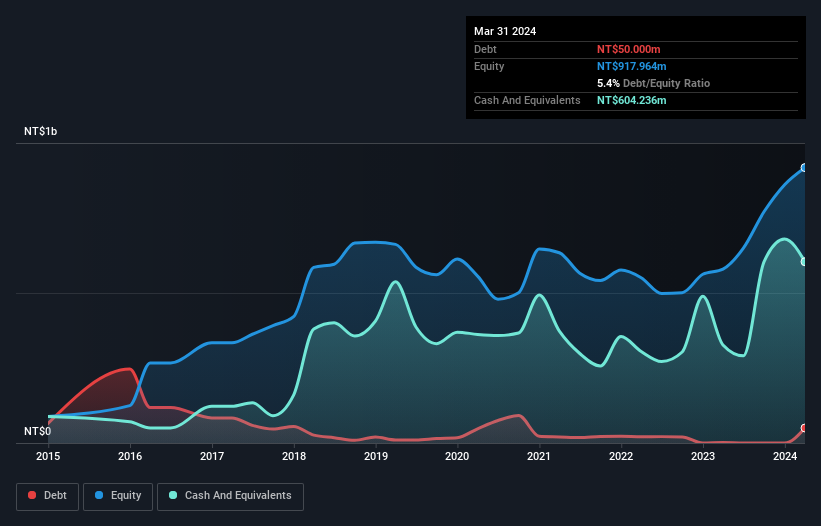David Iben put it well when he said, 'Volatility is not a risk we care about. What we care about is avoiding the permanent loss of capital.' So it seems the smart money knows that debt - which is usually involved in bankruptcies - is a very important factor, when you assess how risky a company is. We can see that B'in Live Co., Ltd. (TWSE:6625) does use debt in its business. But is this debt a concern to shareholders?
Why Does Debt Bring Risk?
Debt is a tool to help businesses grow, but if a business is incapable of paying off its lenders, then it exists at their mercy. Ultimately, if the company can't fulfill its legal obligations to repay debt, shareholders could walk away with nothing. While that is not too common, we often do see indebted companies permanently diluting shareholders because lenders force them to raise capital at a distressed price. Of course, debt can be an important tool in businesses, particularly capital heavy businesses. When we examine debt levels, we first consider both cash and debt levels, together.
See our latest analysis for B'in Live
What Is B'in Live's Debt?
As you can see below, at the end of March 2024, B'in Live had NT$50.0m of debt, up from NT$2.00m a year ago. Click the image for more detail. However, it does have NT$604.2m in cash offsetting this, leading to net cash of NT$554.2m.

How Healthy Is B'in Live's Balance Sheet?
According to the last reported balance sheet, B'in Live had liabilities of NT$648.8m due within 12 months, and liabilities of NT$56.7m due beyond 12 months. Offsetting this, it had NT$604.2m in cash and NT$362.8m in receivables that were due within 12 months. So it actually has NT$261.6m more liquid assets than total liabilities.
This surplus suggests that B'in Live has a conservative balance sheet, and could probably eliminate its debt without much difficulty. Simply put, the fact that B'in Live has more cash than debt is arguably a good indication that it can manage its debt safely.
Even more impressive was the fact that B'in Live grew its EBIT by 776% over twelve months. If maintained that growth will make the debt even more manageable in the years ahead. When analysing debt levels, the balance sheet is the obvious place to start. But you can't view debt in total isolation; since B'in Live will need earnings to service that debt. So when considering debt, it's definitely worth looking at the earnings trend. Click here for an interactive snapshot.
Finally, a company can only pay off debt with cold hard cash, not accounting profits. B'in Live may have net cash on the balance sheet, but it is still interesting to look at how well the business converts its earnings before interest and tax (EBIT) to free cash flow, because that will influence both its need for, and its capacity to manage debt. Over the last two years, B'in Live actually produced more free cash flow than EBIT. There's nothing better than incoming cash when it comes to staying in your lenders' good graces.
Summing Up
While it is always sensible to investigate a company's debt, in this case B'in Live has NT$554.2m in net cash and a decent-looking balance sheet. The cherry on top was that in converted 114% of that EBIT to free cash flow, bringing in NT$284m. So is B'in Live's debt a risk? It doesn't seem so to us. When analysing debt levels, the balance sheet is the obvious place to start. However, not all investment risk resides within the balance sheet - far from it. Case in point: We've spotted 1 warning sign for B'in Live you should be aware of.
Of course, if you're the type of investor who prefers buying stocks without the burden of debt, then don't hesitate to discover our exclusive list of net cash growth stocks, today.
Valuation is complex, but we're here to simplify it.
Discover if B'in Live might be undervalued or overvalued with our detailed analysis, featuring fair value estimates, potential risks, dividends, insider trades, and its financial condition.
Access Free AnalysisHave feedback on this article? Concerned about the content? Get in touch with us directly. Alternatively, email editorial-team (at) simplywallst.com.
This article by Simply Wall St is general in nature. We provide commentary based on historical data and analyst forecasts only using an unbiased methodology and our articles are not intended to be financial advice. It does not constitute a recommendation to buy or sell any stock, and does not take account of your objectives, or your financial situation. We aim to bring you long-term focused analysis driven by fundamental data. Note that our analysis may not factor in the latest price-sensitive company announcements or qualitative material. Simply Wall St has no position in any stocks mentioned.
Have feedback on this article? Concerned about the content? Get in touch with us directly. Alternatively, email editorial-team@simplywallst.com
About TWSE:6625
B'in Live
Operates as a show production company in Taiwan and internationally.
Solid track record with excellent balance sheet.
Market Insights
Community Narratives



